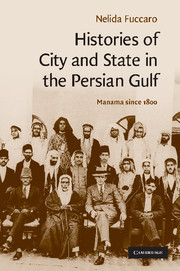Book contents
- Frontmatter
- Contents
- List of illustrations
- List of maps
- Acknowledgements
- Note on transliteration and terminology
- Glossary
- List of abbreviations
- Map 1 The Persian Gulf and Bahrain in the regional context
- Map 2 Bahrain's settlements
- CAMBRIDGE MIDDLE EAST STUDIES 30
- Introduction
- 1 Indigenous state traditions and the dialectics of urbanisation in Bahrain, 1602–1923
- 2 The making of Gulf port towns before oil
- 3 Ordering space, politics and community in Manama, 1880s–1919
- 4 Restructuring city and state: the municipality and local government
- 5 ‘Disorder’, political sociability and the evolution of the urban public sphere
- 6 City and countryside in modern Bahrain
- Conclusion
- Bibliography
- Index of persons, tribes and families
- Index of subjects
- Index of places
6 - City and countryside in modern Bahrain
Published online by Cambridge University Press: 20 January 2010
- Frontmatter
- Contents
- List of illustrations
- List of maps
- Acknowledgements
- Note on transliteration and terminology
- Glossary
- List of abbreviations
- Map 1 The Persian Gulf and Bahrain in the regional context
- Map 2 Bahrain's settlements
- CAMBRIDGE MIDDLE EAST STUDIES 30
- Introduction
- 1 Indigenous state traditions and the dialectics of urbanisation in Bahrain, 1602–1923
- 2 The making of Gulf port towns before oil
- 3 Ordering space, politics and community in Manama, 1880s–1919
- 4 Restructuring city and state: the municipality and local government
- 5 ‘Disorder’, political sociability and the evolution of the urban public sphere
- 6 City and countryside in modern Bahrain
- Conclusion
- Bibliography
- Index of persons, tribes and families
- Index of subjects
- Index of places
Summary
This final chapter examines the making of Manama as an oil town and capital city. The focus is the impact of state intervention on the built environment and on urban life, and the contrast between these developments and those in the agricultural hinterland of Bahrain. The impact of oil did not trigger a new dialect of urbanisation, in the sense that it did not radically transform the patterns of settlement which had become apparent in the nineteenth century. Cultivators, turned into oil workers, continued to reside in their ancestral towns and villages, some of which were absorbed into Manama's metropolitan area after the oil boom of the 1970s. Awali, the first modern oil town (madinah al-naft) in the Gulf, built in 1937 by the American-owned BAPCO, developed as a ‘neocolonial’ settlement, a gated community which housed a new class of European and American technocrats who run the industry.
Oil revenue and state centralisation did not efface the traditional political and socio-economic differences between Manama and the rural areas inhabited by the indigenous Shi‘i population. Rather, they enforced a new set of inequalities. In the oil era, historical legacies and inequalities continued to be enshrined in built environments and social landscapes, as they had been in the days of pearling. Manama became the harbinger of Bahrain's modernity as well as that of the entire Persian Gulf.
- Type
- Chapter
- Information
- Histories of City and State in the Persian GulfManama since 1800, pp. 191 - 219Publisher: Cambridge University PressPrint publication year: 2009



